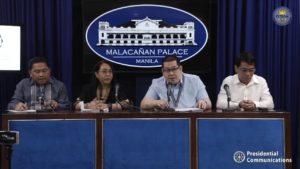

The Bureau of Customs (BOC) and Bureau of Internal Revenue (BIR) are set to start random field tests and confirmatory tests on fuel products by the middle of February to check for compliance with the government’s fuel marking program.
BOC assistant commissioner and spokesperson Atty. Vincent Philip Maronilla, in a press briefing on January 29, said BOC, BIR, and field testing technicians from project contractor SGS-SICPA will be conducting the random field tests on fuel products at gas stations, tank trucks, and depots.
Maronilla said that initially scheduled to start on February 3, the random field tests have been moved to the middle of February to give time to those affected by the Taal Volcano eruption this month to get back to normal operations.
Marking of fuel products, whether imported or manufactured in the Philippines, becomes mandatory five years after the Tax Reform for Acceleration and Inclusion (TRAIN) law took effect January 2018.
The fuel marking program has two parts: fuel marking, which started in August last year, and random field testing and confirmatory tests, to begin next month.
Maronilla said the government has already marked more than 2 billion liters of fuel in terminals and refineries in Batangas, Cebu, Naga, Subic, Bataan, Leyte, Davao, and Cagayan De Oro.
READ: Implementation of fuel marking program starts
Petroleum companies whose facilities have undergone initial fuel marking are Seaoil, Pure Petroleum Corp., Phoenix Petroleum Corp., Unioil Petroleum Philippines, Pilipinas Shell Petroleum Corp., and Chevron Philippines, Inc.
Maronilla said the fuel marking program is part of the government’s anti-smuggling efforts, noting that around P40 billion in government revenue was being lost to petroleum smuggling yearly, a figure validated by various independent studies.
BOC Enforcement Group deputy commissioner Sandy Teddy Raval, during the same briefing, said data shows increases in revenue collection from oil shipments since the Tax Reform for Acceleration and Inclusion (TRAIN) Law, which raised the excise tax on imported fuel, was imposed in 2018.
Raval said the collection jumped from P45.9 billion in 2017 to P91.9 billion in 2018, the first year the TRAIN Law was implemented. Collection increased again to P145.2 billion in 2019.
Raval said declared volumes of fuel have also increased since the implementation of the TRAIN Law.
In 2015, declared volume of oil importations was at 10.7 billion, and increased to P11.4 billion in 2016 and slightly in 2017 with 11.45 billion. In 2018, the start of the law, it grew to 12.39 billion then climbed to 14.8 billion in 2019.
Maronilla said BOC attributes the increase in revenues from oil shipments to “those who have usually been evading payment of taxes [and] are now fearful of the program so instead of actually having the long arm of the law finally catch up with them, they’re trying to pay the right duties and taxes now.”
In 2019 BOC was tasked to collect P10 billion under the fuel marking program, but this was not realized as only the fuel marking part was implemented last year. This year, Maronilla said BOC has not yet been given a target but he noted that it might be set around the same figure.
Screengrab from Radio Television Malacañang




